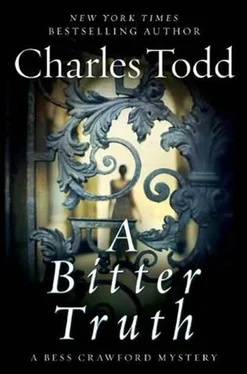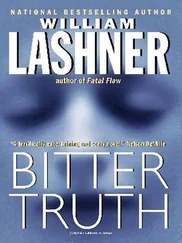“Because he couldn’t find you. Please, let me be certain she is alive and well, and he will begin to pay again for her care.” I did a swift inventory of the money I had with me, remembering how Roger Ellis had had to borrow sums from George Hughes. There was no one I could borrow money from-unless it was Sergeant Larimore. “I have some money with me. I can leave it with you to show his good faith.”
She relented finally. “Very well. But you will not speak to her. Only observe. This is the only home she has known. Do not alter that in any way.”
“I promise.”
I was taken to a small parlor heated by a coal fire in the grate. The rest of the house was damp and cold. The children were sitting on the floor, and I could see that the nun had been reading to them from a French children’s book. They looked up as I entered, their faces bright with curiosity. Visitors were a rarity.
I greeted them, and my gaze swept the circle, stopping on the fair, blue-eyed child nearest the hearth. Although pale from her recent illness, I could see that the remaining scabs were dry and healing.
She smiled at me in that way that some children have when meeting a stranger, and now I could see what George Hughes had seen, a likeness perhaps not as strong as he had wished to believe it was, but so pronounced that this child and Juliana could have been sisters. I wanted very much to speak to her, to hear her voice, to hold her on my lap and watch the play of emotions on her face.
I’d never known Juliana, but now I understood why she had left such a void in her family. The portrait had done her justice, and even the memorial stone had captured something of the living child. But here was the warmth and the smile and the tilt of the head and the lovely blue eyes under fair lashes that gave life to the static reflections of her.
I couldn’t understand how Roger Ellis could abandon her.
And would Lydia be able to love her, when she was the image of Juliana?
The nun touched my elbow, reminding me that I had had my brief glimpse and must be satisfied. I allowed her to escort me from the room, and I gave her what money I could, not nearly enough, but I needed sufficient funds to reach England and travel on to Ashdown Forest.
“When I return,” I said, “there will be more. Keep her safe.”
She thanked me gravely, and I could tell that even that meager amount was appreciated.
Just as I was about to walk out the door, I asked, “What will become of her, if there is no family to take her and educate her?”
“We have already spoken of this, Sister Marie Joseph and I. We will find her work out in the world, if that is what she chooses. Our girls learn to sew beautifully. They will be in demand for fine work. If she has a vocation, and we shall pray that God will be so kind,” she said, “we will welcome her into our house. Surely when the Germans have gone, we will be able to rebuild.”
It was a very different point of view from Sister Marie Joseph’s, that Sophie’s beauty could be a curse. What’s more, I couldn’t imagine Sophie as a seamstress at someone else’s beck and call, or a nun, shut away from the world for the rest of her life. I wanted to argue vehemently against either possibility. But I had to remember that without the care of the nuns, Sophie might not have survived at all.
I left then, and went back to my waiting taxi. We reached the harbor to find my ship already at the quay. I waited for the wounded to be taken aboard and then followed them.
“There is no cabin for you, Sister,” one of the officers told me. “But there’s a chair in what used to be the lounge, if you care to sit there.”
“That will do very well,” I said and went to the rail to watch our departure. The gangway was brought in, the ropes cast off, and we were free of the land, swinging with the tide, the engines rumbling under my feet.
I was about to walk on to the lounge, when across the water soared the call of that Australian kingfisher. Loud and clear, heads turning to see what it was and where it was coming from.
And there, behind the barriers on the quay was a tall man waving his distinctive hat, his face a blur, but I thought it was surely split from ear to ear by that cocky grin.
He’d escaped Nurse Barlow again and come down to see me off. She would be exasperated with him, and he would blandly tell her he was feverish again and off his head.
Still, I waved back, distinctly cheered.
It wasn’t until the ship moved slowly out into the current, heading downstream toward the sea, that I finally went below.
My orders were to report directly to Inspector Rother in Wych Gate. But they didn’t forbid finding a telephone as soon as we landed in Portsmouth, before I went on to meet my train.
I put in a call to my parents.
They were delighted to hear my voice and know that I was in England. But I had to tell them the reason why I wouldn’t be coming home.
My father said, “I must be away tomorrow morning. But Simon is in London. Shall I send him to Sussex?”
“Please, would you? I shall need a means of getting about.” And it would be a touch of home for me.
We talked for a few minutes more, as I assured my mother that I was well and hoped to have leave again soon. A little white lie for her comfort, I told myself.
The train to London met with the usual delays, and when I arrived at Waterloo Station, I collected my things and prepared to go in search of the next available connection to Hartfield.
Instead I found Simon Brandon waiting to help me descend from the carriage, and then he reached inside to take up my valise.
“The motorcar is this way.”
A cold rain was falling, but as we handed in my ticket and went out into the fading light, he studied my face and said, “Your mother wished to know how you looked. Tired, but well enough. That sums it up, I should think.”
I smiled. “Yes, very well. Simon, I’ve seen the little French child. Her name is Sophie.” And I went on to tell him how I’d managed to find her, and what I’d discovered.
We had reached the outskirts of London as I finished the account. Simon nodded, “I was fairly sure you would search. Against all advice.”
“There was so little opportunity to look for her. I despaired of finding her. But an Australian sergeant, his name is Larimore, put the word out, compiled a list of convents from the responses he received, and had it delivered to me by way of a wounded Scot. It made all the difference.”
“And you say Ellis knows nothing about this?”
“I don’t think he does. But running into him prevented me from speaking to the solicitor to ask how the child might be returned to her natural father.”
“Hardly your place, Bess.”
“Yes, I’m aware of that. But I’d have liked to know if it was even possible. That would guide me in deciding what to do about telling Roger Ellis-or Lydia, for that matter-that I know where Sophie is. Which reminds me, I shall need some money before I return to France. I gave the sister at the orphanage all that I could spare. They have so little, and the children need so much. French law may be very different from English law in these matters. And there’s the fact that Roger was never officially registered at Sophie’s father.”
“Leave it, Bess. You’re unwise to grow attached to this child.”
“I’m not attached. But I have become aware of another side of this war, Simon. It’s difficult enough for us to make sense of it. Think what a child who has lost everything must feel, when the future appears to be so bleak and comfortless.”
We drove on in silence, covering the miles of winter-bare England, and I wished we were heading in the direction of Somerset, on the other side of London.
Читать дальше












